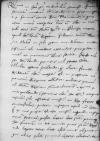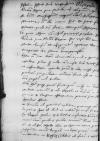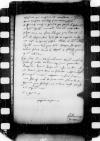24 huius venit huc ⌊Mauritius⌋, a quo citra moram acceptas litteras cum oleo in arcem tuli, erat tunc ⌊maiestas reginalis⌋ in Kwrza Noga[1] apud decumbentem ⌊regem⌋, hilarem tamen. Nam ⌊sua maiestas⌋ in solo genu uno dolorem intensissimum, ubi incedere attentat, propter motum et curvationem illius sentit, stando autem seu decumbendo penitus nil dolet.
Multa essent scribenda, quam alacri fronte desideratum oleum acceptum est in praesentia non paucorum, ⌊regina⌋ callidior, audiens primum ad ⌊maiestatem regiam⌋ commendationem Vestrae Reverendissimae Dominationis, interpellando (sentiens oleum hoc esse) arripuit vasculum, sibi asserens missum, cui rex facete contrastabat, interim inscriptio vasculi non lecta, sed ex me quaesitum est, utri missum. Respondi inscriptionem docturam, postea litterae lectae sunt, primaeque haec fuerunt in tot annis, quas solum regem vidi legere totas, licet astitimus aliquot, qui alias soliti sumus legere, oblatas, et praesertim praesente domino ⌊vicecancellario⌋. Misit postea sua ⌊maiestas regia⌋ pro scatula, ubi reliquum a Reverendissima Dominatione Vestra dominum ⌊archiepiscopum⌋ acceptum oleum diligenter servatur, cum illo inani hic ex siccis floribus extracto, quod tunc statim contemptum segregatum. Et quia adhuc nonnihil prioris probati habetur, noluit sua ⌊maiestas regia⌋ hoc vasculum tam diligenter clausum et obsignatum aperire, ne, inquit, evaporet, ita serva Lwgowski.
Heri, cum ⌊suam maiestatem⌋ admonerem, si quid Vestrae Reverendissimae Dominationi vellet rescribere, hilari quoque vultu commisit domino vicecancellario, ut responderet, agendo gratias de oleo misso, quod probatum singularem utilitatem facit, etc. Ut in litteris scriptum, nil dubito.
⌊Maiestati reginali⌋ quoque gratum fuit, cum mihi in litteris ostenderet, articulum de ⌊Georgio Hegel⌋, ut litteras dum a domino comite de Nassaw afferentur, prius suae maiestati legendas offerat.
De concilio nil penitus auditur, parvaque vel nulla potius spes est illud, ut indictum scimus futurum. Ex ⌊Neapoli⌋ habui his diebus a factore dominorum ⌊Fuccarorum⌋ litteras, quibus scribit timorem ⌊Turcae⌋ imminutum, et ob hoc tepide illic et ⌊Genuae⌋ arma parari suscipiuntur tamen Neapoli milites, quorum mille mittentur in regionem ⌊Calabriae⌋ ad farum e regione ⌊Messinae⌋, qui ingruente necessitate in paucis horis traicere ⌊Siciliae⌋que succurrere possunt.
8 huius misi Vestrae Reverendissimae Dominationi per servum ⌊domini Gedanensis⌋ sculptum lapillum carneolum. Nunc autem mitto eadem sculpta arma in ferro oblongo, quo licet uti non solum ad obsignandas litteras, sed et argentea ac stannea vasa eo signari possunt, mitto et alium calibeum lapillum annularem pro domino ⌊Georgio⌋, de his tribus solvit dominus ⌊Georgius Hegel⌋ 4 florenos, prout aequum videbatur.
Ego licet non in toto convaluerim, tamen melius habeo quam antea. Abiturusque sum perendie ⌊Neapolim⌋, ⌊Barium⌋, ⌊Rossanum⌋, etc. tandem ad ⌊caesaream maiestatem⌋. Faxit Deus ut feliciter negotia ⌊serenissimorum principum⌋ meorum conficiam. Interim me spemque meam de canonicatu commendo Dominationi Vestrae Reverendissimae, quae felicissime valeat.



